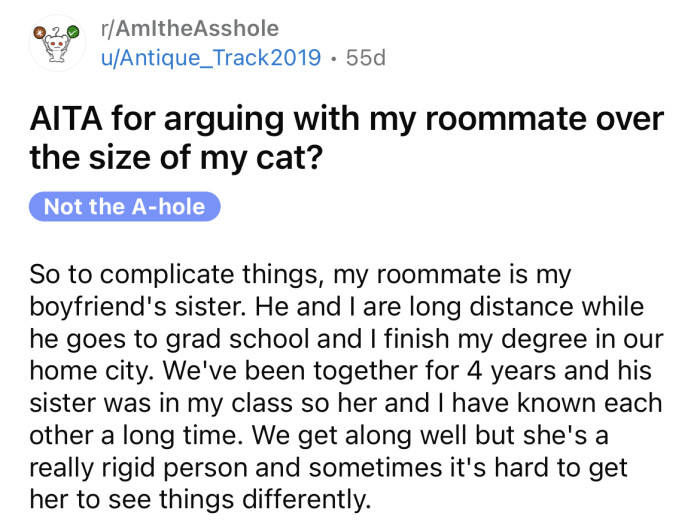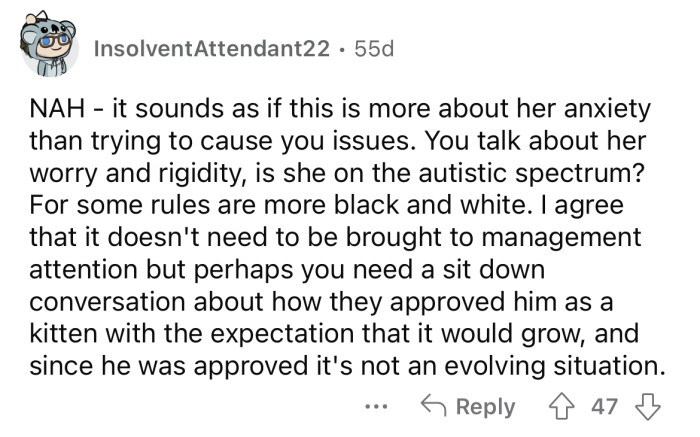Redditor Asks For Advice After Her Roommate Threatens To "Confess" Her Cat's Weight To Their Building Management
Roommate relationships can be tricky sometimes. Opinions differ, lifestyles can be different, and things can just get a little complicated.
Reddit user u/Antique_Track2019 recently shared a story in the AITA (Am I The A**hole?) subreddit about an issue she is currently having with her roommate. The OP explained that her situation is especially complex because her roommate is also her boyfriend's sister.
The OP says they moved in together around eight months ago, and at the time, the OP had a six-month-old kitten. The kitten was approved by the building management. However, their policy says "no pets over 10 lbs" are allowed.
Of course, kittens don't stay small, and the OP's cat is now a big boy weighing in at 15 lbs. The OP's roommate has become severely stressed over this and is insisting that the OP tell the building management about the cat's weight.
But the OP says it's a non-issue, and it would be crazy to create a problem for no reason. The roommate is worried that they will "get caught," and she says if the OP won't go and tell the building, then she will.
The OP told her roommate that she needs to "get her anxiety under control," but she has since complained about the OP to the rest of her family. Keep scrolling to see how people reacted.
The OP asked if she's an a**hole for arguing with her roommate over the size of her cat.

She explained that she moved in with her boyfriend's sister around eight months ago, and the OP had a six-month-old kitten at the time.

The kitten has since grown to be a big boy who weighs 15lbs.

Understanding the Psychology Behind Pet Ownership
According to Dr. Karen Allen, a behavioral psychologist studying human-animal interactions, pets often serve as emotional support, providing companionship and reducing stress.
Research indicates that the bond between humans and pets can significantly enhance mental well-being, as pet ownership is associated with lower levels of anxiety and depression.
It's important to recognize how societal expectations about pet care can create stress for pet owners, especially in shared living situations where differing values collide.
The Psychological Impact of Pet Ownership
Pet ownership can significantly impact mental health, often serving as a source of companionship and emotional support. Research from the Human-Animal Bond Research Institute indicates that interactions with pets can reduce feelings of loneliness and increase overall happiness. In this case, the roommate's concern about the cat's weight reflects a deeper connection to pet care and responsibility.
However, the conflict of interest arises, as the roommate's intention to report the cat's weight to building management may stem from anxiety or a perceived lack of control over the situation. This behavior could indicate an underlying fear of the consequences of being viewed as an irresponsible pet owner, which may affect her self-esteem and social standing.
The OP's roommate is concerned that the cat is now over the weight limit and wants the OP to notify the building.

The OP says she doesn't believe it's a valid issue, but her roommate is now complaining to the rest of the family about it.

Here's how people reacted.

A study published in the Journal of Personality and Social Psychology shows that people often project their insecurities onto others, leading to conflicts like the one faced by this Redditor.
This projection can manifest as criticism, particularly when individuals feel their own choices are being judged or questioned.
Understanding this can help foster empathy and compassion in interpersonal relationships, especially when discussions become heated.
Cognitive dissonance theory explains how individuals experience psychological discomfort when their actions conflict with their beliefs. In this scenario, the roommate's threat to 'confess' about the cat's weight suggests an internal conflict between her desire to be seen as a responsible pet owner and the social pressure of potentially facing scrutiny from management. This dissonance can lead to irrational decisions as she tries to reconcile these conflicting beliefs.
"Don't make an issue of it."

"Why is she making an issue over nothing?"

"Cat tax!"

The Impact of Social Dynamics
Social psychologists have found that shared living arrangements can strain relationships when individual expectations aren't clearly communicated.
Research indicates that misunderstandings about responsibilities can lead to resentment, which in turn can exacerbate tensions in a household.
It's crucial for roommates to establish clear communication channels and boundaries to mitigate these issues, allowing for healthier interactions.
Navigating Conflicts in Shared Spaces
When living with roommates, establishing clear boundaries and responsibilities is crucial. Research from the Journal of Environmental Psychology suggests that shared living arrangements often lead to interpersonal tensions when expectations are not communicated effectively. The roommate's actions could be viewed as a desperate attempt to regain control over the situation, highlighting the need for open dialogue about pet care responsibilities.
To mitigate conflicts, it's advisable to hold regular discussions about shared responsibilities and establish a pet care plan that includes each person's role. This proactive approach can foster a sense of teamwork and reduce misunderstandings.
"She's trying to create problems."

"You're fine."

"This is more about her anxiety than trying to cause you issues."

Utilizing conflict resolution strategies, such as active listening and empathy, can significantly improve roommate relationships.
Experts suggest that having regular check-ins about shared responsibilities can help maintain a positive living environment.
Furthermore, discussing feelings openly can prevent misunderstandings, fostering a sense of teamwork rather than competition or judgment.
Emotional regulation strategies can also be beneficial in situations like this. Techniques such as mindfulness and cognitive reframing can help individuals manage their emotional responses to stressful living situations. By focusing on the positive aspects of shared living—such as companionship and support—roommates can cultivate a more harmonious environment.
"No one is going to care."

"She needs to butt out."

NTA.

So, she wants you to move out?

Okay, but has your cat transformed into a large dog?

"It's a house cat, not a f***ing lion."

"It's a cat. They allow cats."

Anxiety is tough.

"They just assume cats are all 9lbs."

"Management would laugh!"

What's your take on this situation? Do you think the OP should notify the building management about her cat's weight, or is her roommate being entirely unreasonable here?
Either way, perhaps the OP could be a little more understanding of her roommate's anxiety. It may be a non-issue to the OP, but for her roommate it's become extremely stressful.
We would love to hear your opinions on this. You can share your thoughts with us in the comment section.
Expert Opinion
This situation highlights the common tensions that can arise in shared living arrangements, particularly regarding responsibilities for pet care. It's essential for roommates to communicate openly about their expectations and concerns to avoid misunderstandings that can lead to conflict.
Analysis & Alternative Approaches
Interpersonal relationships, especially in shared living spaces, require effective communication and mutual understanding to function smoothly. Psychological research emphasizes the importance of addressing conflicts directly to prevent resentment and promote healthier dynamics. By fostering open dialogue and establishing clear responsibilities, roommates can create a more supportive living environment.
Expert Opinion
This situation illustrates how unresolved conflicts about responsibility can escalate into larger issues within shared living contexts.
When individuals feel attacked or judged, their natural instinct is often to defend their position, which can further strain relationships.
Analysis & Alternative Approaches
Ultimately, the interplay between pet care and human relationships is complex and multifaceted.
Understanding each other's perspectives is vital for maintaining harmony in shared spaces.
As noted by psychological resources, fostering open communication can lead to healthier living environments and reduce stress for all involved.




